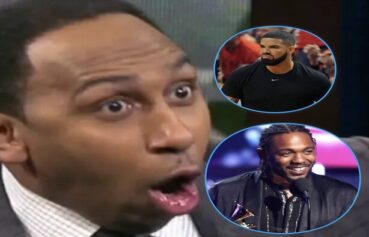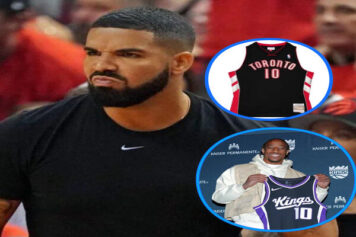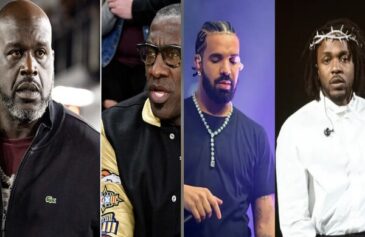History is filled with empires that have fallen from great heights into rubble. Populations that once were adorned in silks and linens are reduced to wearing rags over the course of time, as foreign invaders now roam their lands and dominate their local radio stations. They are forgotten by their allies and left to fade from time’s notice. Hope is all that is left. Hope that one who encompasses all that is right about that civilization will rise up from their midst. A perfect embodiment of his genealogy and raised on fanciful tales in which his countrymen are always victorious. Kendrick Lamar can certainly relate to the preceding allegory. Born in 1987, he seems to have been created for one purpose: To represent his metaphorical countryman when they are no longer representing.
His career arc has carried him to his destiny as Kendrick stands at the zenith of music industry recognition. Nominated for seven awards at the 56th Annual Grammy Awards, he was up for Album of the Year, Best New Artist, Best R&B performance for "How Many Drinks" as a featured guest on Miguel’s track. He’s also up for Best Rap Performance for “Swimming Pools,” Best Rap/Sung Collaboration for “Now or Never” with Mary J. Blige, Best Rap Song for "F***in Problems,” and the Best Rap Album Good Kid, M.A.A.D. City. If he'd won for overall Best Album, he would have been only the third hip-hop artist behind Lauryn Hill (Miseducation of Lauryn Hill) and Outkast (Speakerboxxx, The Love Below) to accomplish this feat.
History remembers a time when New York City’s Empire ruled the hip-hop landscape. But along came a group of West Coast usurpers to the crown. With such artists as Ice T, Kid Frost and Arabian Prince planting the early seeds, West Coast gangsta rap grew until its popularity eventually rivaled that of NYC’s. Boasting artists like NWA, Snoop Dogg and Tupac Shakur, some would say the West Coast Empire was even more powerful during its short reign. At its height, the best beat makers, emcees and rap renegades were the ambassadors of gangsta rap and would be instrumental in solidifying the empire. Even if it was only for a short period of time.
Born in Compton, would it be too far a reach to believe Lamar’s lullabies were sung by NWA? Were his nursery rhymes to a Snoop Dogg cadence?
With the death of Tupac Shakur and Christopher “Notorious B.I.G.” Wallace, two great empires would lose royalty. Kendrick Lamar was about 9-years-old when Pac died in 1996. He was 10-years-old when Biggie passed a year later. Lamar would also witness the fall of that great rap Camelot known as Death Row Records as it was weighed down by the mismanagement of Suge Knight and a virtual talent vacuum that happened when Dr. Dre departed. No one wanted to work with or for the brutish Knight.
The West Coast Empire would steadily become less and less relevant on the charts. Dr. Dre and Snoop Dogg were the only names that remained relevant in the national spotlight consistently.
There were others empires rising at the time as well.
The Dirty South Empire had risen to prominence while the ancient NYC Empire became stagnant and set in its ways. A once young ambitious prince would grow into a power hungry monarch. All things happen in cycles and the west would once again get its chance to shine when the Game stepped into the spotlight in 2002. He was good, but he wasn’t prolific. A flash in the pan, a placeholder of sorts. That’s not to diss him at all, but only a great one can bring back an empire.
Purpose in life is something we all search for at one time or another. Sadly, most people never find what they truly want out of life. Luckily, Lamar didn’t have that problem. Though it would seem as if Kendrick Lamar suddenly fell out of the sky and landed on the charts, the success of his album Good Kid, M.A.A.D. City is the culmination of more than a decade of hard work. Though he only has two studio albums (Overly Dedicated and Good Kid, M.A.A.D. City), Lamar has released five mixtapes. For a time he wasn’t even the most popular artist on his own label (T.D.E.) appearing as a guest on many occasions.
His label mate, Jay Rock, would garner commercial success before Lamar with his single “All My Life in The Ghetto,” featuring Lil’ Wayne and will.i.am. But Kendrick’s accession to the throne was destined from birth. When his “Cartoon & Cereal” single featuring Gunplay was released in early 2012, the rap hemisphere immediately took notice. See for yourself below.
But Kendrick was still somewhat obscure to the general population. Though the rap game was already aware of this young lion in the making, his name did not garner much recognition outside of the genre.
However, that would all change once he signed with Dr. Dre in 2010 and moved over to Aftermath. While his Overly Dedicated, released on Top Dawg Entertainment, was critically acclaimed, it wasn’t insanely successful. Still, from the very beginning, Lamar gained the artistic respect and acknowledgement of all of his musical contemporaries. But when he dropped Good Kid, M.A.A.D City, the rest of the world would be amazed. People who haven’t listened to hip-hop music in decades are being inspired to once again tune in thanks in large part to the young prince from Compton. On the offering, he uses his signature cadence, superior beat selection, a peppering of auto-tune and well placed interludes to weave a creatively rich tapestry the likes of which hip-hop has not seen in quite some time.
He shows us another side of Compton on Good Kid, M.A.A.D. City, a side where not everyone is a gangster or thug and survival is all the more tenuous when you’re just a regular guy who is unaffiliated and simply trying to live in a harsh environment.
On the opening track "Sherane," Lamar spins a cautionary tale against thirst. It’s a warning for young men to exercise good judgment in their carnal affairs, or risk being caught up. Quite a different take from the norm. Listen to the artform below.
A similar cautionary take was spun on "The Art of Peer Pressure.” Except, this time the caution is about choosing the right friends.
Smoking on the finest dope, aye aye aye aye
Drank until I can't no more, aye aye aye aye
Really I'm a sober soul but I'm with the homies right now
And we ain't asking for no favors
Rush a nigga quick then laugh about it later, aye aye aye aye
Really I'm a peacemaker but I'm with the homies right now
And momma used to say
One day, it's gon' burn you out
One day, it's gon' burn you out, out
One day, it's gon' burn you out
One day, it's gon' burn you
I'm with the homies right now.
The ethereal track that is the bedrock of the song "Money Trees" (featuring Jay Rock) is a dreamy joyride into ghetto aspirations and a poor man’s nightmare.
Dreams of living life like rappers do
Bump that new E-40 after school
You know big balling with my homies
Earl Stevens had us thinking rational
Back to reality we poor, ya bish
Another casualty at war, ya bish
Two bullets in my Uncle Tony head
He said one day I'd be on tour, ya bish
That Louis Burger never be the same
A Louis belt will never ease that pain
Listen closely to this banger below.
Though the album does contain many of the hip hop attributes that critics frown upon, such as sex, money, drugs and gang violence, the cautionary underpinnings of the set provides a moral framework that give it a soul that is largely absent from the genre today as well.
Good Kid, M.A.A.D. City is filled with lessons. You just have to know what you’re hearing. "Swimming Pools,” one the album’s most commercially successful offerings, warns against the dangers of alcohol in excess. The piano driven mechanism of melancholia that is "Sing About Me, I’m Dying of Thirst" provides a hook that resonates in the hearts of the ghetto-trapped black male, and circumstance-consumed young black female. Lamar rhymes as a gangster wondering aloud whether he will be remembered positively despite his past transgressions. On another verse he responds to a young woman taking Lamar to task for rhyming about her allegorical sister on Section 80. She tells Lamar how she followed in her sister’s footsteps because of circumstance. Soulfully moving, artistically marvelous, and quintessentially hip-hop. Check it out.
For those who grew up during the cocaine 80s, Lamar’s creative touch and subject matter harkens back to an era when it was absolutely essential for an emcee to be original in cadence and relevant to the masses. How many men who grew up in depressed environments can recall often wondering whether or not you'd ever make it out?
Everyone that was successful before you was a reminder of your own shortcomings. Jealousy is an evil thing consuming hope. Only the strong can admit to not succumbing to it at one time or another. On the bonus track "Black Boy Fly,” Lamar admits being jealous of NBA star Arron Afflallo, and former Aftermath rapper and one-time West Coast rap royal the Game, before his own fame came into view.
Beyond the dope beats and harrowing hood tales, Lamar is not only trying to bring the west coast back, but return hip-hop to a form of musical artistry and creativeness. Personally, my favorite song is "Good Kid.” It informs the listener of the reality of growing up in the hood. Everyone is not a gangsta, yet all citizens must live under the battlefield rules. Not every black man is a criminal, but all must live under virtual martial law in high crime areas. The beat, dramatic and forward-moving, acts as a nail to drive Kendrick’s words home in the minds of the listeners.
As the record spin I should pray
For the record I recognize that I'm easily prey
I got ate alive yesterday
I got animosity building, it's probably big as a building
Me jumping off of the roof is me just playing it safe
But what am I supposed to do when the topic is red or blue
And you understand that I ain't, but know I'm accustomed to
Just a couple that look for trouble and live in the street with rank
No better picture to paint than me walking from bible study
And called his homies because he had said he noticed my face
From a function that tooken place, they was wondering if I bang
Step on my neck and get blood on your Nike checks
I don't mind because one day you'll respect
The good kid, m.A.A.d. city
Listen to Kendrick's harrowing tale below.
If Lamar would have rested on his laurels, then perhaps I wouldn’t be writing about him to the extent that I am. If he released an album and then became a part of the ball of confusion that most rappers engage in, then perhaps I would see him as being such a protégé. Maybe he wouldn’t have that special aura.
But he solidified his standing as an immortal over the summer when he called out all of his pertinent contemporaries on the Big Sean track "Control.” The lyrically abrasive flows called J.Cole, Big K.R.I.T., Wale, Pusha T, Meek Mill, Drake, ASAP Rocky and a slew of others by name. The controversy arose when Kendrick dared to say that he was king of New York, a fabled seat of rap royalty. The emcee who runs NY is the ruler of all hip-hop, no matter the geographic location. The verse was so incendiary that rappers who weren’t even named felt compelled to respond. Lupe Fiasco, Joell Ortiz, Cassidy, Joe Budden and a legion of others.
Some felt as if it was a publicity stunt. But the move was genius, because not only did it add to his name recognition, but he shook the cage of a stagnant rap game that had changed to the point where it was okay to promote those whose artistry had very little substance. He sent people back to the studio. Somewhere, a would-be rival pushed his album back, and a producer suddenly realized he had to pay more attention to his craft. It was all because of Kendrick. The game is far better off with him in it today than if he were not.
The only person at the Grammys who was nominated more than Kendrick is Jay Z with nine nods. Rap duo Macklemore & Ryan Lewis, singer Justin Timberlake, and Pharrell Williams were each nominated for seven as well. Is it ironic that Lamar will faced Jigga in every rap category that he appeared in? Not only is it ironic, but fitting as well. In order to be a king, you must challenge the crown until defeat. The reality of the matter is that Jay Z isn’t going anywhere, anytime soon. However, defeating him in any category would move Kendrick past superstar status and make him a supernova legend.
Kendrick should've won the Grammy Award for Album of the Year, hands down. None of the other nominees affected the landscape of their respective genres quite like Lamar. He knows and respects his rap roots and is a consummate lyricist in a day when such a skill is not considered a predicator to a true emcee. Kendrick is a rapper with a revitalizing quality the likes of which NYC, LA, and cities in between have been waiting on for decades. Everyone yells and screams about bringing NYC back. But no one has done it. And because of this, Compton’s Cali King places the West Coast Empire on the verge of rising again, hopefully uniting the coasts through the artistry of hip hop. Challenging emcees to step their game up and don't stop. All hail the King.



